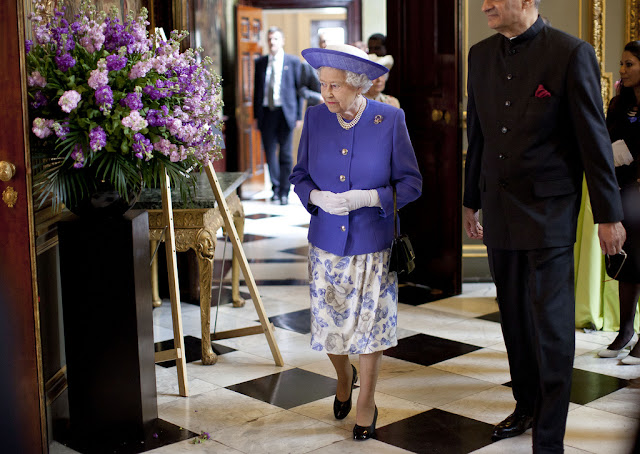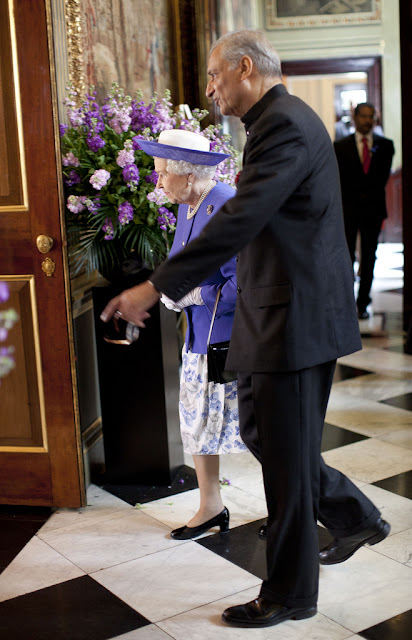THE COMMONWEALTH SECRETARIAT LUNCHEON WITH HER MAJESTY THE QUEEN
Opening Remarks at the Global Counterterrorism Forum
Hillary Rodham Clinton
Secretary of State
Secretary of State
Conrad Hotel
Istanbul, Turkey
June 7, 2012
Thank you very much, Ahmet, and once again, thank you for hosting us in this beautiful city and for being a steadfast champion of this forum. I want to recognize all of our colleagues around the table. It is often easier to focus on the concerns and crises of the moment, but the long-term partnership we are building through this forum, we believe, will pay off for years to come.
In recent years, the international community has made important strides in the fight against violent extremism in all its forms. We’ve worked together to disrupt terrorist financing; pass new and more effective counterterrorism laws; tighten border, aviation and maritime security; and improve international coordination. Over the past decade, more than 120,000 suspected terrorists have been arrested around the world, and more than 35,000 have been convicted. Usama bin Ladin is dead, al-Qaida’s core leadership ranks have been devastated, and many of its affiliates have lost key operatives. Our citizens are safer because of the work we have done together.
But despite this progress, the danger from terrorism remains urgent and undeniable. The core of al-Qaida that carried out the 9/11 attacks and other attacks in countries represented here today may be on the path to defeat, but the threat has spread, becoming more geographically diverse as groups associated with al-Qaida expand their operations. Terrorists now hold territory in Mali, Somalia, and Yemen. They are carrying out frequent and destabilizing attacks in Nigeria and the Maghreb. Here in Turkey, the PKK continues its long campaign of terror and violence, which has claimed tens of thousands of lives. The United States stands strongly with Turkey in its fight against the PKK. And groups are now actively encouraging lone wolf terrorists like those responsible for recent killing sprees in Europe.
That’s why this forum and the international cooperation it represents are so vital. Just as the threat we face crosses borders and oceans, so must our response. We need a strategic, comprehensive approach to counterterrorism that integrates both military and civilian power that uses intelligence, law enforcement, diplomacy, development, humanitarian assistance, and every possible partner and asset.
Because we have learned that to defeat a terrorist network, we need to do more than remove terrorists from the battlefield. We need to attack finances, recruitment, and safe havens. We need to take on ideology and diminish its appeal, particularly to young people. We need to improve conditions for women, because their security is a bellwether for societies’ security, and we need to help build the capacities of nations that have the political will to take on this fight.
The Global Counterterrorism Forum emphasizes strengthening civilian institutions as a critical part of our strategy. And we’re already taking important steps to put this into practice, building new partnerships with the United Nations and other multilateral bodies, and knitting together far-flung counterterrorism efforts that need better focus and organization.
Let me just highlight two areas where it is essential we continue to make progress.
First, we have to continue working together to defeat extremist ideology, blunt the spread of radicalization, and slow the flow of recruits to terrorist networks. Last summer, the UAE took an important step when it announced it would host the first-ever international center developed to combat extremism and develop those best practices that will do so. I am pleased to announce that the United States will support this effort with both funding and expertise, and that the center, I’m told, will open its doors in Abu Dhabi later this fall, although it already has its own brochure, which is a good step to demonstrate the concreteness of the work that will be done at the center.
Think of what the center can do: Bring together experts on communications who understand how to undermine terrorist propaganda; the smartest minds on law enforcement, who can help governments and communities learn to ward off extremism and expose intruders; scholars of education, who can devise curricula free of hatred and give teachers the tools to protect at-risk children from recruitment by extremists.
The second area I want to mention is the rule of law. Experience tells us that democracies are better equipped than autocracies to stand up against terrorism. They offer constructive outlets for political grievances, they create opportunities for mobility and prosperity that provide alternatives to violent extremism, and they tend to have more effective governing institutions.
The protests of the Arab Awakening struck a devastating blow to the extremists’ ideology. Citizens in the Middle East and North Africa claiming their universal rights, demanding more accountable governments, seeking broader economic opportunities, all without the rhetoric of hate and destruction that al-Qaida claimed was the only way to achieve change. Now the transitions underway have the potential to transform and improve counterterrorism efforts across the region. This forum is helping make that happen.
Last year as a group, we pledged more than $90 million to provide rule of law training for police, prosecutors, judges, and prison officials in countries seeking to turn their backs on more repressive approaches to counterterrorism. I am pleased that today this forum will adopt two sets of sound practices – one for the criminal justice sector, the other on rehabilitation and reintegration of violent extremist offenders in prison. These will advance our work, and I am proud to announce the United States is contributing $15 million to support training initiatives in these areas, and to launch new partnerships with the UN and others to make sure our assistance gets to those officials on the front lines who need it most.
And I am here today also to underscore that the United States will work with all of you to combat terrorists within the framework of the rule of law. Now some believe that when it comes to counterterrorism, the end always justifies the means; that torture, abuse, the suspension of civil liberties – no measure is too extreme in the name of keeping our citizens safe.
But unfortunately, this view is short-sighted and wrong. When nations violate human rights and undermine the rule of law, even in the pursuit of terrorists, it feeds radicalization, gives propaganda tools to the extremists, and ultimately undermines our efforts. The international community cannot turn our eyes away from the effects of these tactics because they are part of the problem.
I know that the United States has not always had a perfect record, and we can and must do a better job of addressing the mistaken belief that these tactics are ever permissible. That is why President Obama has made our standards very clear. We will always maintain our right to use force against groups such as al-Qaida that have attacked us and still threaten us with imminent attack. And in doing so, we will comply with the applicable law, including the laws of war, and go to extraordinary lengths to ensure precision and avoid the loss of innocent life.
We view this forum as a key vehicle for galvanizing action on these fronts and for driving a comprehensive, strategic approach to counterterrorism. And I’m very pleased that in this short period of time, as Ahmet said, the forum is already living up to its promise to emphasize results, not rhetoric, and to spark the innovation that is essential for keeping up with an ever-changing, dynamic threat.
And so I thank the members of the forum for taking on the changing methods that terrorists use to fund their efforts. For example, because of our coordinated pressure, terrorists are increasingly abandoning the formal financial system and funding their operations through criminal activities. Kidnapping for ransom has emerged as a favored tactic; it’s most acute in the Sahel, has long been a concern in Latin America, and is now spreading worldwide. We need to intensify our international cooperation to deal with this issue by finalizing this fall the guidelines discussed at the meeting in Algiers earlier this spring so countries have the best tools available for dealing with hostage-taking and extortion.
The work we need to do, whether on stopping kidnapping for ransom, countering violent extremism, or strengthening rule of law, require focus and tenacity. Now those of us around the table are here for a few hours, but the experts who are working with us work day in and day out. And it is a true honor to have this venue for policymakers and practitioners, because after all, we’re here because we face implacable foes who are determined to kill civilians, disrupt societies, and spread their ideology of hate. And we cannot afford to work at cross-purposes or to pursue policies that obstruct cooperation or fuel radicalization. All of us share a commitment to take on this challenge, and the United States is very proud to continue working with you to further our common efforts.
Thank you very much.







































